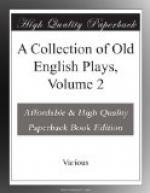[81] ‘Heere, here’ is a correction (in the MS.) for ‘what then?’
[82] MS. Trime.
[83] These words are crossed out in the MS.
[84] Therefore this play would seem to have been acted at the Whitefriars, i.e. at the Salisbury Court theatre. (F.G. Fleay.)
[85] The “jig” seems to have been a comic after-piece consisting of music and dancing. In Mr. Collier’s Hist. of Dram. Lit., iii. 180-85 (new ed.), the reader will find much curious information on the point. The following passage from Shirley’s Love in a Maze (1632) is not noticed by Mr. Collier:—
“Many
gentlemen
Are not, as in the days of
understanding,
Now satisfied without a jig,
which since
They cannot, with their honour,
call for after
The Play, they look to be
serv’d up in the middle:
Your dance is the best language
of some comedies
And footing runs away with
all; a scene
Express’d with life
of art and squared to nature
Is dull and phlegmatic poetry.”
—Works (ed. Gifford and Dyce), ii. 339.
[86] MS. him.
[87] The name of the musician, I suppose; but the reading of the MS. is somewhat illegible.
[88] The passage at first ran as follows: “Umh, how long have I slept, or am I buried and walke in Elizium as the poets faine? Goe to, where are they? in the ayre? I can percieve nothing nor remember anything has been don or said!”
[89] ’Grimes. Soe, now retire a little. Ile play him one fitt of mirthe on my trebble to rouse him. Ext.’ These words occur in the left-hand margin. Probably they should stand here in the text ‘Ext.’ may mean either ‘exeunt’ (musicians) or ‘exit’ (Grimes to disguise himself).
[90] ’Who are these! ha! the towne waits? why, how now, my masters, whats the matter, ha?’—Passage cancelled in MS.
[91] ‘Bakside’ is a correction (in the MS.) for ‘buttock.’
[92] “Here Gent[lemen], share this amongst yee and pray for Grimes.” These words (addressed to the musicians) follow in the MS. but have been scored through.
[93] The MS. gives “aurescion.”
[94] The reading of the MS. seems to be “inuolute.” Mr. Fleay suggests “invocate.”
[95] The repetition of ‘loath’ in the next line is suspicious.
[96] The arrangement of the verse is not easy: perhaps we should read—
’Wishes for husband.
A proper Gent[leman]; Ime happy
She has made so iuditious an election.’
Our author usually makes a trisyllable of “gentleman”; here it counts only as a monosyllable.
[97] Between this word and the next there is a mark of omission in the MS., and the words “t’were Sir” have been written above.
[98] What follows, to the entrance of Thurston, is marked to be omitted. I have thought fit to restore it to the text. “Here’s Mr. Thurston," concludes Clariana’s speech.




